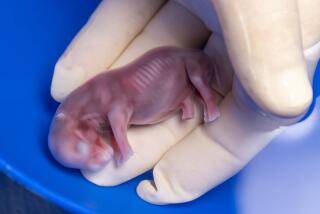AIDS Is Induced in Chimp, Long a Goal of Researchers
- Share via
WASHINGTON — For the first time, scientists have managed to give AIDS to a chimpanzee, providing a possible substitute for people in testing ways to control the disease.
Since the AIDS epidemic began, about 100 chimps have been intentionally given the AIDS virus in an effort to learn more about the disease. But while these animals get infected, none until now had actually developed AIDS.
Researchers from the Yerkes Regional Primate Research Center at Emory University in Atlanta described the first chimp AIDS case at a medical conference Tuesday.
One of the things that has made AIDS so difficult to control has been the lack of a so-called animal model: a lab animal that can stand in for people in studies of the disease.
While monkeys get sick with a simian version of HIV, the AIDS virus, researchers fear that insights from studying those animals may not apply to people.
The discovery of true AIDS in a chimpanzee could give scientists their first animal model for the disease. But whether this will be practical is still unclear. It took 10 years for the animal to develop the disease.
Another drawback is controversy about using chimps for medical studies. These animals are humans’ closest relative, and they are endangered in the wild.
The development was announced at the annual Conference on Retroviruses and Opportunistic Infections.
New York researchers, meanwhile, reported in the February issue of Nature Medicine that whey might provide a new way to help keep the AIDS virus from infecting people during sex.
A modified version of a protein extracted from whey blocked the AIDS virus from infecting cells in the test tube, researchers report.
Whey is produced when milk is made into cheese. Most of it is then used in other products, including ice cream, bread, pie crust and canned soups.






